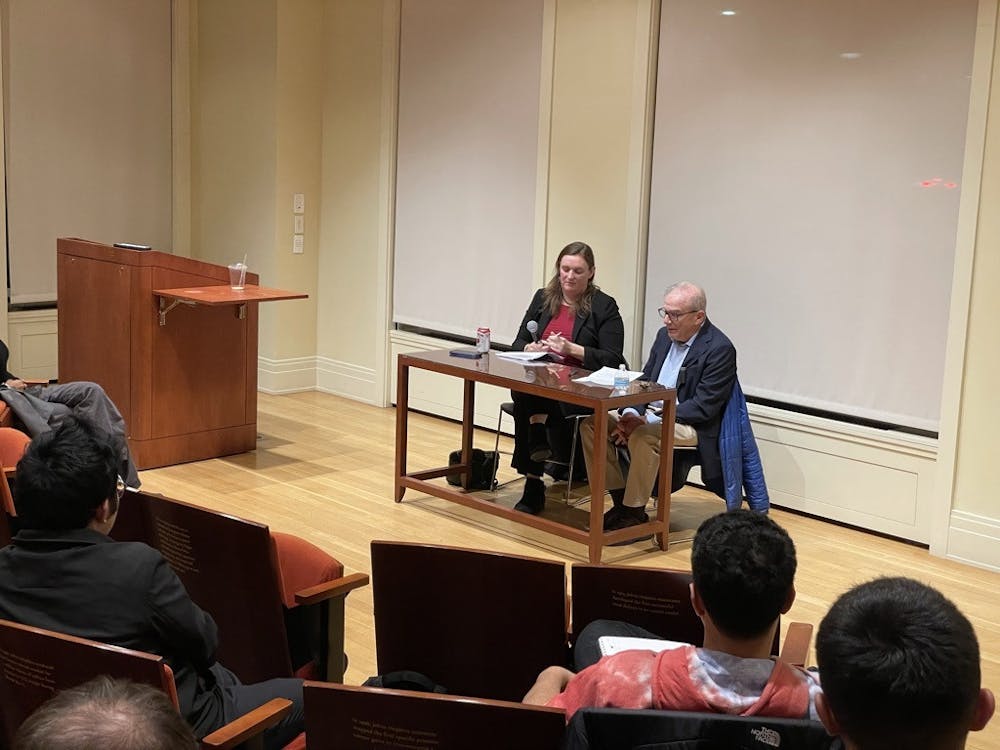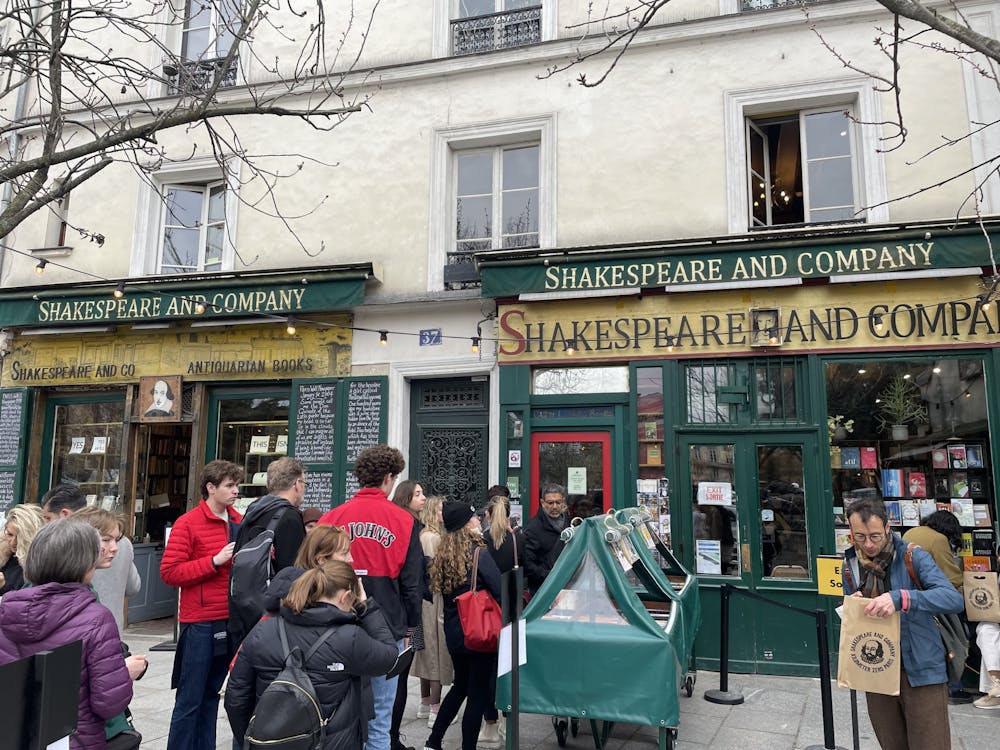Content Warning: The following article includes topics some readers may find triggering, including descriptions of murder and sexual assault.
Professor of Political Science Steven David and Aronson Associate Professor of International Studies and Political Science Adria Lawrence joined in a conversation regarding the current Israel-Hamas conflict on Thursday, Nov. 30. The event was jointly hosted by the International Studies Leadership Council, IDEAL and the Alexander Hamilton Society.
The discussion opened with 20-minute presentations by each professor, followed by an opportunity for each to respond and challenge the points raised by the other; it concluded with an open audience Q&A session. Lawrence, a scholar of Middle Eastern and North African politics, colonialism and nationalism, began by explaining the role of scholarship in understanding developing events.
“The aim of a scholar is to try to explain and understand where different parties are coming from, but explanation is distinct from justifications. Explaining why people take the actions they do isn't the same as justifying them. My research focuses on developing explanations,” she said.
She proceeded to discuss the motivations behind Hamas’ Oct. 7 attack, noting that the stalled Israeli-Palestinian peace process, West Bank settlements, Israel’s relationships with other Arab nations, including Saudi Arabia, left Hamas and other Palestinian actors with few options for changing the situation. David agreed with this analysis.
“Their aim was to shake things up to put the conflict back on the world agenda, to try to reverse the dwindling external support for the Palestinian cause outside of Palestine,” Lawrence said. “In some ways, when I read some quotes from Hamas leadership, it reminded me a little bit of why people said that they voted for Trump — they just wanted to see something change.”
Drawing upon her scholarship, Lawrence nuanced the label of “settler colonialism,” which is often applied to Israel. She noted that while she believes aspects of colonialism are present in the West Bank and Gaza, the specific label of “settler colonialism,” in which settlers from a powerful state depart and form another state, is not an accurate representation of Israel’s founding.
She also highlighted that Israel’s formation and the current opposition to it must be considered in relation to the long history of antisemitism. While she doesn’t believe that all critiques of Israel are antisemitic, antisemitism can play a role in them and shapes how they are read by those sensitive to antisemitic tropes.
Lawrence closed her presentation by explaining that conflicts between state and non-state actors such as Hamas are inherently asymmetric, since non-state actors would lose in a direct confrontation with a state. Instead, they engage indirectly, such as using civilians as shields and taking hostages. However, Israel’s use of military force to combat non-state actors like Hamas may have long-term consequences.
“We have plenty of evidence that repression and trying to crush Hamas can work to an extent in the short term, but also that this kind of repression and collective punishment that affects non-members of Hamas can lead to further radicalization,” she said.
David began his lecture by noting that he would not be giving a dispassionate, scholarly talk, but instead would be drawing upon his lived experiences as a Jew to inform his understanding of the conflict. He began to discuss the acts of terrorism which took place on Oct. 7, explaining his use of the word.
“Terrorism, for me, is violence against non-combatants to create fear for a political purpose. This is exactly what these Hamas terrorists did. If you can't call them terrorists, I don't know what terrorism is,” he said. “You look their mothers in the eye, you murder them. You rape people, you take them back to Gaza and parade them half naked through cheering crowds.”
He drew further attention to Hamas’ founding charter, which calls for the utter destruction of Israel, their repeated claims that the events of Oct. 7 will happen again and the fact that Hamas lies on Israel’s doorstep. Due to these reasons, David said he understands the Israeli government’s goal of destroying Hamas, particularly because deterrence — persuading someone against an action with threats of unacceptable punishment if they do it — has failed.
For David, it is unclear what an unacceptable punishment would look like for Hamas, which does not seem to care about the Palestinian lives in Gaza. David maintained that if an actor cared about its people, it would not launch attacks knowing retaliation would follow. However, he highlighted that Israel is in a very difficult position.
“How do you destroy this evil, vile group, Hamas, without killing a lot of innocent civilians? That's a difficult, maybe impossible task, when Hamas embeds itself with civilians, putting weapons in hospitals, mosques and schools,” David said.
David then expressed the disappointment felt by many in the Jewish community over responses to the Oct. 7 attacks, the Jewish connection to the land of Israel and rising antisemitism in pro-Palestinian statements and activism.
“Among Jewish students, there's a feeling of isolation and betrayal, especially from the progressive movement. Many have been very active in a lot of different progressive movements — fighting systemic racism, fighting for human rights, fighting for women's rights and so on,” he said. “Yet, when you have this brutal assault, where are these people? Where are the women's groups complaining about the mass rape?”
During the Q&A portion of the event, a questioner asked David if he believed that Israel’s response constituted genocide against Palestinians. David said that he did not, citing that genocide refers to an attempt to destroy a group of people in whole or in part, for which he sees no evidence. He added that if we wish to keep genocide as a meaningful term, it should only be applied where it is appropriate.
Lawrence then asked David if he thought this was an instance of ethnic cleansing, which she believes may be suggested by policy suggestions including requests to open the Egyptian border. However, she noted that both accusations are hard to prove, as they are reliant on knowing intent. David said there might be elements of ethnic cleansing, recalling the 1948 War.
In total, the event was attended by approximately 100 students and faculty. IDEAL Educational Chair junior Iris Gupta said in an interview with The News-Letter that she was glad that attendees were able to participate in a productive conversation regarding the conflict with experts in the field.
“I think something that's productive for understanding and discussing conflicts like this is hearing points of view that you haven't already and using that to gain a more comprehensive understanding,” she said.
In an interview with The News-Letter, senior Yael Klucznik likewise felt that the conversation was balanced in offering both Israeli and Palestinian perspectives, expressing hope that further conversations will take place.
“Both professors did a great job at presenting claims with examples, definitions and context, which was helpful in understanding,” she said. “I do think future events should incorporate a larger panel of professors from different scholarly backgrounds to get a more cohesive discussion, but overall it seemed a productive start in fostering civil conversations.”





